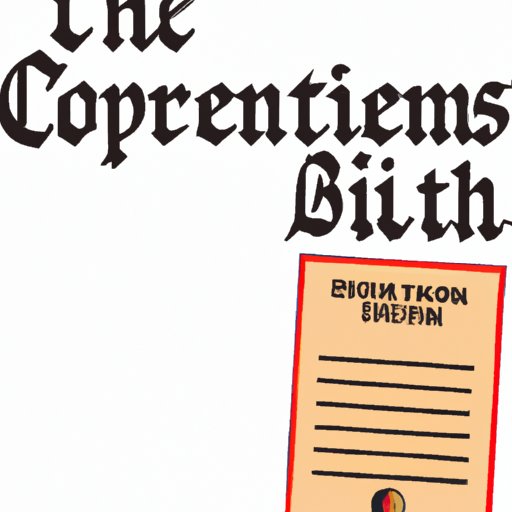Introduction
The U.S. Constitution and its amendments are the cornerstone of American democracy, ensuring our rights and protecting our freedoms. However, among the 27 amendments, which one reigns supreme? This article explores each amendment in the Bill of Rights, analyzes their historical and modern relevance, compares and contrasts their strengths and weaknesses, and delves into public opinion and philosophical perspectives to determine the most important amendment.
A Historical Approach
The Bill of Rights, ratified in 1791, contains the first ten amendments to the Constitution. These amendments were added to address perceived gaps in citizen’s rights and to limit the power of the government. Each amendment has its unique background and significance, but only a few can truly claim lasting impact. Among those, the First Amendment, guaranteeing freedom of speech, religion, press, assembly, and petition, stands out. Throughout history, it has protected minority rights, challenged authority, and fostered public discourse. For example, the Civil Rights Movement of the 1960s relied heavily on freedom of speech and assembly to push for changes in social policy and legal systems. Additionally, it has transformed into a global model for free speech rights and has served as a beacon of hope for oppressed societies worldwide.
A Modern Perspective
Today’s world presents new challenges to individual rights and freedoms, such as the rise of censorship, fake news, and social media echo chambers. In this context, the Fourth Amendment, protecting individuals from unreasonable searches and seizures, is the most relevant. It guards privacy in a world where technology is increasingly pervasive and governments are becoming more invasive than ever. For example, the 2013 revelations by whistleblower Edward Snowden exposed the extent of the U.S. government’s mass surveillance programs. The Fourth Amendment’s protection of individual privacy is critical to ensuring that governments cannot undermine the fundamental rights of their citizens.
A Comparative Analysis
While the First and Fourth Amendments are undoubtedly vital to our society, each amendment has its own scope, depth, and application. For instance, the Sixth Amendment, guaranteeing the right to a fair trial, has played a considerable role in shaping the American justice system and ensuring that all citizens, not only the wealthy and powerful, have access to due process. However, the harsh reality is that equal justice under the law is still not a reality for many marginalized communities. Thus, the Eighth Amendment, prohibiting cruel and unusual punishment, is crucial for safeguarding human dignity and ensuring that punishments fit the crime. However, its implementation has been problematic, particularly regarding the death penalty and the treatment of prisoners.
A Public Opinion Approach
Public opinion is a critical aspect of understanding the most important amendment. Based on various surveys and studies, the responses vary significantly depending on demographics, political affiliation, and personal experiences. However, the First Amendment and Fourth Amendment consistently rank as the most important among American citizens. Most legal experts also favor either the First or Fourth Amendment due to their historical and modern significance and the challenges they pose to our democracy. Elected officials tend to rank the Second Amendment, guaranteeing the right to bear arms, as the most important.
A Philosophical Perspective
The philosophical underpinnings of each amendment are deeply complex and vary among different ideologies and schools of thought. For me, the amendment that resonates the most with my beliefs is the Fourteenth Amendment, guaranteeing equal protection under the law, which has been pivotal in ending segregation, providing marriage equality, and expanding civil rights protections for marginalized communities. It aligns with my fundamental values of equality, justice, and human dignity.
Conclusion
In conclusion, the most important amendment in the Bill of Rights depends on various factors, such as historical significance, modern relevance, scope, depth, application, public opinion, and philosophical perspectives. While different amendments may resonate with different individuals, the First Amendment and Fourth Amendment continue to be the most important for most Americans due to their essential role in preserving individual rights and protecting our democracy. However, in today’s society, the Fourth Amendment may be the most crucial for safeguarding individual privacy against government surveillance and abuse of power. Further research and discussions on this topic are necessary to ensure that we continue to uphold our fundamental rights as individuals and as a democracy.
